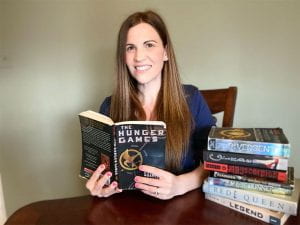“Each year that I teach the dystopian book club unit, students are drawn to the action, drama, suspense, and meaningful issues that the novels explore. What I never imagined in my lifetime is that our own world would turn upside down because of a virus and start to take on characteristics of a dystopian society,” remarks South Orangetown Middle School seventh-grade ELA Teacher Stephanie Stehly.
Stehly explains that, in dystopian novels, there is often an apocalyptic event that changes everything and results in a world that is undesirable and frightening. When thrown into the unusual world of the novel, readers wonder how it happened and what went wrong.
“For us, the catastrophic event is the novel coronavirus and, just like in a fictional dystopian text, new rules and customs have emerged,” says Stehly. “Whoever thought that we would need to adhere to social distancing, mandatory mask-wearing, and strict stay-at-home orders? The government almost always plays a large role in the lives of dystopian protagonists and, right before our eyes, the presence of both our state and federal officials has increased through daily press conferences. There is also a lot of fear and uncertainty now, just like in the books students are reading.”
Stehly’s dystopian unit focuses on reading literature through a critical lens. Students analyze features of the texts, such as power relationships, character archetypes, systemic obstacles, how symbols shift and connections between dystopian societies and our world. “Students are amazed when they learn how dystopian authors use their stories to warn people about important issues they worry about or what could happen if catastrophic events occur,” she notes. “One of my fourth-period students wrote ‘I thought about how in a few decades, [this pandemic] would make a good dystopian book for kids.’”
Students become members of the “dystopian club” when they join the countless students and adults worldwide who are fascinated by the genre. This year, students are reading “Divergent,” “The Hunger Games,” “Cinder,” “Legend,” “The Maze Runner,” “The House of the Scorpion,” “Among the Hidden,” “Scythe,” and “Red Queen.” Stehly is using “The Giver,” “Harrison Bergeron,” “Examination Day,” the song “Wings,” and the short Pixar film “Wind” to model the analytical thinking students are expected to do.
A student in Stehly’s third-period class commented, “I think this is the perfect time to read dystopian books because of what is going on. I think I am submitting to power because I am following the rules given by the government. But I also think I am seeking power because I want to go back to school and I want to be able to go back out to the world.”
Students are also learning about archetypes, such as the hero, villain, mentor and sidekick. A student in Stehly’s fourth-period class observed that “the coronavirus is like a villain in the dystopian world…I feel like I’m in a story and I am a character.” Another first-period student wrote, “Some of us are living with heroes. I’m living with my sister who is becoming a nurse. My uncle is a cop and he also has to work at this time, so I’m very thankful for both of them.”
The timing of the unit was entirely coincidental. Students had just begun reading “The Giver,” a Newbery award-winning dystopian text, as a whole class novel before schools closed. “I feel fortunate that I was able to get into the book closet on the last day we were in school so I could send kids home with a book for our next unit on what I perceived then to be the ‘off chance’ that I wouldn’t see them for a little while,” says Stehly.
To make this unit work during distance learning, Stehly has been making screencasts of mini-lessons and assessing students’ understanding through assignments on Google Classroom. One benefit of pre-recorded lessons: students can replay parts of the video they didn’t understand the first time. Stehly says that she’s been able to connect with each of her students through “check for understanding” assignments and offer personalized feedback.
Shared Google Docs provide book club members with a place to virtually discuss their thoughts; each student devises theories and questions to add to the document and replies to club members. Some clubs have also chosen to communicate live through video and Google Chat.
Stehly has been thrilled by students’ engagement and feedback:
- “I am loving ‘The Hunger Games’ so far. . . I love stories where the characters are against the odds and have to fight their way out of a tough situation.”
- “The reading is going great. I am understanding the book [‘Cinder’] perfectly. I like the book because it is kind of like what we are going through now.”
- “I understand it well and the book is actually one of the best books I’ve ever read because every time a chapter ends I want to read more.”
- “My reading is going really well…I like [‘Legend’] because it has multiple things going on at once. It has plague, war, poverty…I also like it because I think it’s interesting to see how the two main characters’ perspectives will play out. I think it is always interesting to read a book from more than one character’s perspective because it gives us insight into a whole other part of the story that we wouldn’t have gotten otherwise.”
“I hope one positive thing students can take away with them after this difficult time is the memory of getting lost in an awesome book and sharing their ideas with others who are on the same page,” she says.


You must be logged in to post a comment.